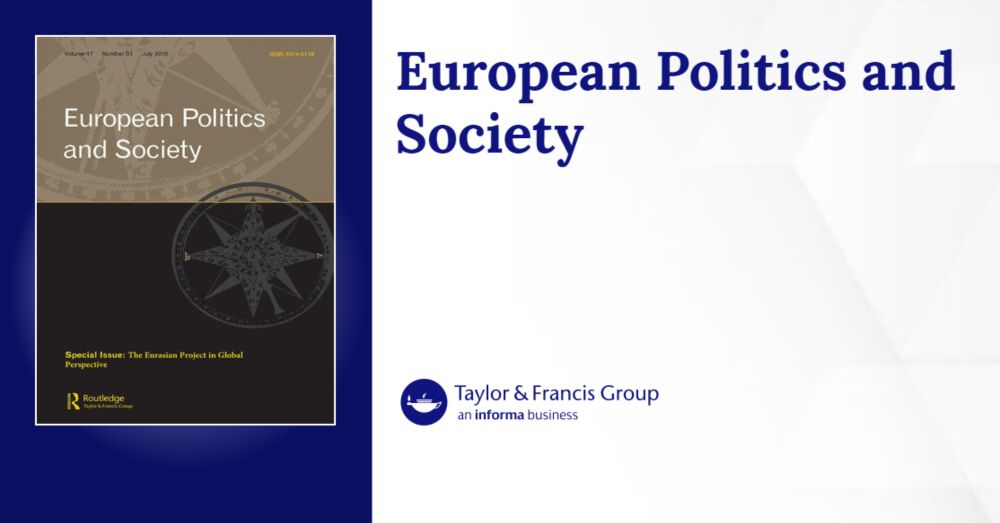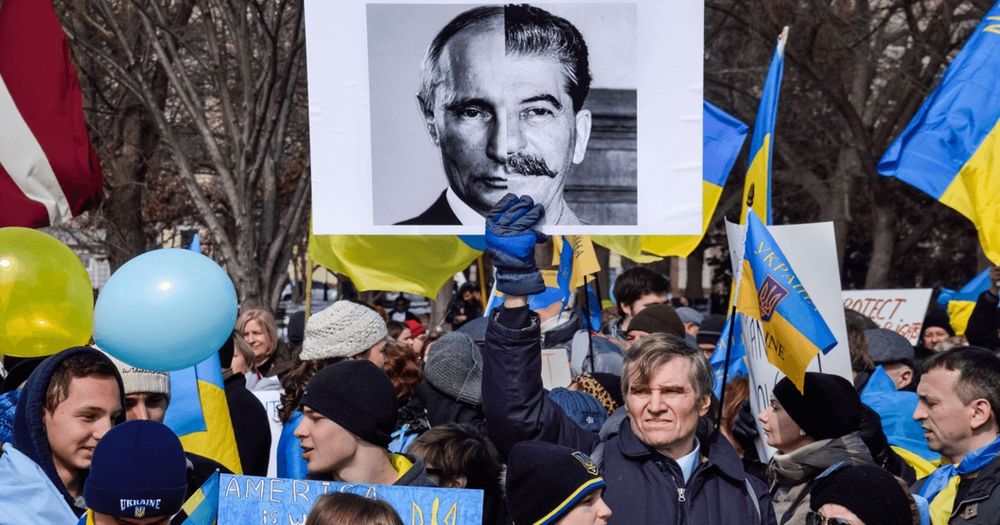
Alexi Gugushvili
@a-gugushvili.bsky.social
Professor of Sociology @ University of Oslo | Editor @ European Societies | Researching social stratification, health inequalities, and political sociology
Reposted by Alexi Gugushvili
🔍 ...a new analysis by @dafnoukos.bsky.social, @a-gugushvili.bsky.social and Tim Vlandas shows that the experience of class decline is a more powerful predictor among a key segment of far-right voters
November 3, 2025 at 12:26 PM
🔍 ...a new analysis by @dafnoukos.bsky.social, @a-gugushvili.bsky.social and Tim Vlandas shows that the experience of class decline is a more powerful predictor among a key segment of far-right voters
🔍 Related insights from Social Forces @sfjournal.bsky.social: Rolling out anti-discrimination laws across Europe did not reduce perceived disability discrimination—and among men, perceptions even worsened.
Laws without broader change = limited impact.
academic.oup.com/sf/advance-a...
Laws without broader change = limited impact.
academic.oup.com/sf/advance-a...
August 25, 2025 at 10:05 AM
🔍 Related insights from Social Forces @sfjournal.bsky.social: Rolling out anti-discrimination laws across Europe did not reduce perceived disability discrimination—and among men, perceptions even worsened.
Laws without broader change = limited impact.
academic.oup.com/sf/advance-a...
Laws without broader change = limited impact.
academic.oup.com/sf/advance-a...
Takeaway:
Anti-discrimination legislation is important, but not sufficient. Real progress for people with disabilities needs:
🔹 Stronger enforcement
🔹 Workplace accommodations
🔹 Broader cultural + structural change
Anti-discrimination legislation is important, but not sufficient. Real progress for people with disabilities needs:
🔹 Stronger enforcement
🔹 Workplace accommodations
🔹 Broader cultural + structural change
August 25, 2025 at 10:05 AM
Takeaway:
Anti-discrimination legislation is important, but not sufficient. Real progress for people with disabilities needs:
🔹 Stronger enforcement
🔹 Workplace accommodations
🔹 Broader cultural + structural change
Anti-discrimination legislation is important, but not sufficient. Real progress for people with disabilities needs:
🔹 Stronger enforcement
🔹 Workplace accommodations
🔹 Broader cultural + structural change
What did change?
📊 We saw slight increases in voting + trust after disability-specific laws…
…but placebo tests suggest these trends were driven by broader societal shifts, not the legislation itself.
📊 We saw slight increases in voting + trust after disability-specific laws…
…but placebo tests suggest these trends were driven by broader societal shifts, not the legislation itself.
August 25, 2025 at 10:05 AM
What did change?
📊 We saw slight increases in voting + trust after disability-specific laws…
…but placebo tests suggest these trends were driven by broader societal shifts, not the legislation itself.
📊 We saw slight increases in voting + trust after disability-specific laws…
…but placebo tests suggest these trends were driven by broader societal shifts, not the legislation itself.
The Nordic model is praised for equality 🌍✨.
But our analysis shows that even strong anti-discrimination laws haven’t closed disability gaps in:
⚖️ Institutional trust
💼 Employment
🙂 Life satisfaction
➡️ Laws alone are not enough.
But our analysis shows that even strong anti-discrimination laws haven’t closed disability gaps in:
⚖️ Institutional trust
💼 Employment
🙂 Life satisfaction
➡️ Laws alone are not enough.
August 25, 2025 at 10:05 AM
The Nordic model is praised for equality 🌍✨.
But our analysis shows that even strong anti-discrimination laws haven’t closed disability gaps in:
⚖️ Institutional trust
💼 Employment
🙂 Life satisfaction
➡️ Laws alone are not enough.
But our analysis shows that even strong anti-discrimination laws haven’t closed disability gaps in:
⚖️ Institutional trust
💼 Employment
🙂 Life satisfaction
➡️ Laws alone are not enough.
⚖️ As leaders debate peace terms, domestic opinion might shape what’s politically acceptable. My article shows European views are fractured, raising doubts about a united European front www.tandfonline.com/doi/full/10....

When the guns fall silent: the variety of European perspectives on the end of war in Ukraine
Russia’s invasion of Ukraine has sparked intense geopolitical debates and public reflection across Europe regarding the likely trajectory and resolution of the conflict. Public expectations about t...
www.tandfonline.com
August 18, 2025 at 7:32 AM
⚖️ As leaders debate peace terms, domestic opinion might shape what’s politically acceptable. My article shows European views are fractured, raising doubts about a united European front www.tandfonline.com/doi/full/10....
📰 Who you are + what you follow matters:
Close news followers = more likely to expect 🇺🇦-favorable outcomes.
Disengaged = more pessimistic/uncertain.
Far-right sympathies = more acceptance of outcomes favoring 🇷🇺.
Close news followers = more likely to expect 🇺🇦-favorable outcomes.
Disengaged = more pessimistic/uncertain.
Far-right sympathies = more acceptance of outcomes favoring 🇷🇺.
August 18, 2025 at 7:32 AM
📰 Who you are + what you follow matters:
Close news followers = more likely to expect 🇺🇦-favorable outcomes.
Disengaged = more pessimistic/uncertain.
Far-right sympathies = more acceptance of outcomes favoring 🇷🇺.
Close news followers = more likely to expect 🇺🇦-favorable outcomes.
Disengaged = more pessimistic/uncertain.
Far-right sympathies = more acceptance of outcomes favoring 🇷🇺.
🌍 Regional divides:
🇩🇰 🇫🇮 🇬🇧 → More skeptical of outcomes rewarding 🇷🇺, shaped by history + security concerns.
🇦🇹 🇪🇸 → More acceptance of concessions, linked to neutrality + economic ties.
Europe is far from united on how the war will end.
🇩🇰 🇫🇮 🇬🇧 → More skeptical of outcomes rewarding 🇷🇺, shaped by history + security concerns.
🇦🇹 🇪🇸 → More acceptance of concessions, linked to neutrality + economic ties.
Europe is far from united on how the war will end.
August 18, 2025 at 7:32 AM
🌍 Regional divides:
🇩🇰 🇫🇮 🇬🇧 → More skeptical of outcomes rewarding 🇷🇺, shaped by history + security concerns.
🇦🇹 🇪🇸 → More acceptance of concessions, linked to neutrality + economic ties.
Europe is far from united on how the war will end.
🇩🇰 🇫🇮 🇬🇧 → More skeptical of outcomes rewarding 🇷🇺, shaped by history + security concerns.
🇦🇹 🇪🇸 → More acceptance of concessions, linked to neutrality + economic ties.
Europe is far from united on how the war will end.
📊 Optimism for a full 🇺🇦 victory is modest:
🇬🇧 10%
🇫🇮 6%
🇦🇹 3%
🇪🇸 4%
Most expect either a compromise or a frozen conflict. This gap between public expectations and political ambitions matters for peace talks.
🇬🇧 10%
🇫🇮 6%
🇦🇹 3%
🇪🇸 4%
Most expect either a compromise or a frozen conflict. This gap between public expectations and political ambitions matters for peace talks.
August 18, 2025 at 7:32 AM
📊 Optimism for a full 🇺🇦 victory is modest:
🇬🇧 10%
🇫🇮 6%
🇦🇹 3%
🇪🇸 4%
Most expect either a compromise or a frozen conflict. This gap between public expectations and political ambitions matters for peace talks.
🇬🇧 10%
🇫🇮 6%
🇦🇹 3%
🇪🇸 4%
Most expect either a compromise or a frozen conflict. This gap between public expectations and political ambitions matters for peace talks.
4/
Why does this matter? Because how we remember the past shapes how we see leaders today. This isn’t just about history, it’s about how people across Europe understand today’s threats. 📖 Read more: doi.org/10.1080/2374...
Why does this matter? Because how we remember the past shapes how we see leaders today. This isn’t just about history, it’s about how people across Europe understand today’s threats. 📖 Read more: doi.org/10.1080/2374...

How Europeans compare Putin and Stalin in the context of Russia's war in Ukraine
This study examines public perceptions of similarities between Vladimir Putin and Joseph Stalin across five European countries: Austria, Denmark, Finland, Spain, and the United Kingdom. The analysi...
doi.org
June 23, 2025 at 6:24 AM
4/
Why does this matter? Because how we remember the past shapes how we see leaders today. This isn’t just about history, it’s about how people across Europe understand today’s threats. 📖 Read more: doi.org/10.1080/2374...
Why does this matter? Because how we remember the past shapes how we see leaders today. This isn’t just about history, it’s about how people across Europe understand today’s threats. 📖 Read more: doi.org/10.1080/2374...
3/
The more people follow news about the war or think it’s a big global threat, the more they see Putin and Stalin as similar. Those who support far-right parties, especially in Austria, are much less likely to make the comparison.
The more people follow news about the war or think it’s a big global threat, the more they see Putin and Stalin as similar. Those who support far-right parties, especially in Austria, are much less likely to make the comparison.

June 23, 2025 at 6:24 AM
3/
The more people follow news about the war or think it’s a big global threat, the more they see Putin and Stalin as similar. Those who support far-right parties, especially in Austria, are much less likely to make the comparison.
The more people follow news about the war or think it’s a big global threat, the more they see Putin and Stalin as similar. Those who support far-right parties, especially in Austria, are much less likely to make the comparison.
2/
Finns and Danes are much more likely to say Putin is “Stalin-like,” probably because of their history with the Soviet Union and how close they are to Russia. Meanwhile, people in Austria, Spain, and the UK are more on the fence.
Finns and Danes are much more likely to say Putin is “Stalin-like,” probably because of their history with the Soviet Union and how close they are to Russia. Meanwhile, people in Austria, Spain, and the UK are more on the fence.

June 23, 2025 at 6:24 AM
2/
Finns and Danes are much more likely to say Putin is “Stalin-like,” probably because of their history with the Soviet Union and how close they are to Russia. Meanwhile, people in Austria, Spain, and the UK are more on the fence.
Finns and Danes are much more likely to say Putin is “Stalin-like,” probably because of their history with the Soviet Union and how close they are to Russia. Meanwhile, people in Austria, Spain, and the UK are more on the fence.
June 16, 2025 at 7:15 AM
2⃣ By age 32, individuals with or who developed these conditions earn notably less than their peers, even after accounting for actual hours worked. This highlights persistent economic disparities tied to early-life health
June 16, 2025 at 7:10 AM
2⃣ By age 32, individuals with or who developed these conditions earn notably less than their peers, even after accounting for actual hours worked. This highlights persistent economic disparities tied to early-life health

